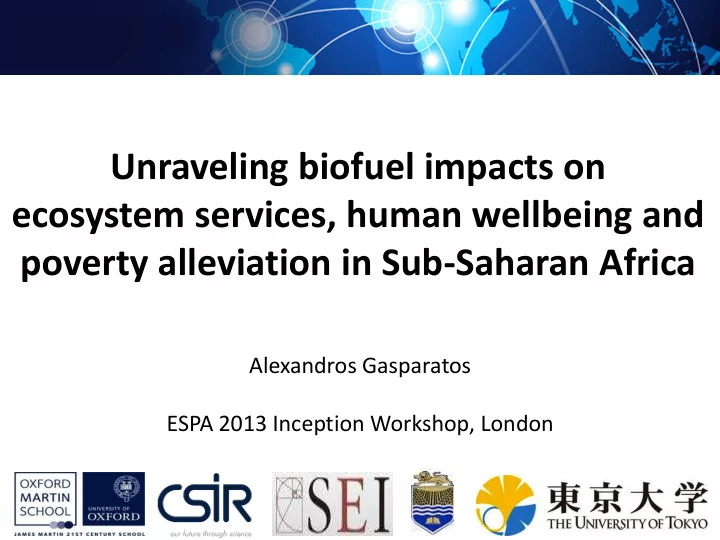

Unraveling biofuel impacts on ecosystem services, human wellbeing and poverty alleviation in Sub-Saharan Africa Alexandros Gasparatos ESPA 2013 Inception Workshop, London
Background
Aims and Objectives Aim Provide clear and consistent empirical evidence on whether (and how) biofuel production and use can alleviate poverty in low income countries of Africa. Objectives Compare the environmental and socioeconomic impacts of different biofuel production modes (and uses) for the main feedstocks in the region; jatropha and sugarcane. Elucidate the mechanisms through which biofuel-driven ecosystem change affects the flows of ecosystem services, and how this links to human wellbeing. Identify operational examples of novel institutional arrangement in biofuel projects that have enhanced poverty alleviation effects
Team University of Oxford, UK * Kathy Willis, PI Council for Scientific and Industrial Research (CSIR), South Africa * Graham von Maltitz, co-I Stockholm Environment Institute (SEI), Sweden * Francis Johnson, co-I Centre for Agriculture Research and Development (CARD), Malawi Charles Jumbe, co-I University of Tokyo, Japan * Alexandros Gasparatos, co-I
Case studies Dwangwa Malawi BERL Malawi Niqel Mozambique SWADE Swaziland
Case studies: by feedstock/production mode Jatropha BERL Malawi, smallholder-based project that works • together with 25,000-30,000 farmers Niqel Mozambique, large-scale plantation (2,250 ha) • Sugarcane SWADE Swaziland, large-scale plantation comprised • of land pooled from family farms Dwangwa Malawi, plantations with a mix of land • tenure mechanisms (e.g. pooled land, outgrowers)
Small scale Original Large scale plantations landscape plantations Low density Medium density High density
Case studies: by use Transport BERL, Niqel, Dwangwa and SWADE produce feedstock that is (or will be) converted into liquid fuel to be blended into fossil fuel for domestic transport Cooking CleanStar Mozambique produces ethanol from cassava and promotes it as a cooking fuel (ethanol stoves) to poor urban households as a substitute to charcoal Lighting BERL blends jatropha oil into paraffin
www.biodiversity.ox.ac.uk/biofuel_landscapes
Information/data flow WP1 ES Assessment (Oxford) IWP1 ES & HW tradeoffs (Oxford) WP2 IWP3 Rural Development Policy (SEI) Recommendations (SEI) IWP2 Multidimensional WP3 Poverty Food Security (CSIR) (Tokyo) WP4 Offsite co-benefits (CSIR)
WP1: Ecosystem Services assessment Hypothesis 1 “Large-scale feedstock production has a much higher detrimental impact on non-fuel provisioning ecosystem services, regulating ecosystem services, supporting ecosystem services and cultural ecosystem services than small-scale feedstock production”.
WP1: Ecosystem Services assessment Feedstock Fuel …may displace, divert and degrade other ecosystem services such as - Food, fodder, fibre - Woodland products (e.g. timber, medicinal plants, wild food) - Water - Climate regulation - Cultural services (e.g. religious/spiritual values, aesthetic and recreational values, etc) - Pollination - Pest regulation - Soil-related services
WP2: Rural development Hypothesis 2i “Biofuel projects provide higher income opportunities than other agricultural activities” Hypothesis H2ii “Smallholder-based biofuel projects offer higher income and employment benefits (more equitably spread) than large plantations”. Hypothesis 2iii “Extra income from smallholder feedstock production increases the resilience of households to livelihood shocks”
WP3: Food security Hypothesis 3 “Biofuel expansion (both large- and small-scale) affects negatively local food security”
WP2 and WP3 Identify the resilience outcomes of each feedstock production mode on (a) employment/income generation, (b) food security and (c) livelihood resilience: Expert interviews • Focus groups • Household level interviews/surveys • Two levels of comparison: Grower vs. non-grower households in the same • community Grower vs. non-grower communities •
WP4: Offsite co-benefits of biofuel use Hypothesis 4i “Substitution of charcoal with biofuels for cooking has a lower negative impact on ecosystems”. Hypothesis 4ii “Substitution of traditional cooking/lighting fuels with biofuels offers energy security and public health benefits” Suggested methods: Expert interviews • Focus groups • Household level interviews/surveys • Energy and econometric modelling •
Information/data flow WP1 ES Assessment (Oxford) IWP1 ES & HW tradeoffs (Oxford) WP2 IWP3 Rural Development Policy (SEI) Recommendations (SEI) IWP2 Multidimensional WP3 Poverty Food Security (CSIR) (Tokyo) WP4 Offsite co-benefits (CSIR)
IWP1: ES and HW trade-offs Bring together the biophysical and socioeconomic data collected by WP1-3: Generalized Linear Models (GLM) or Generalized • Linear Mixed Models (GLMM) Multi Criteria Analysis (MCA) •
IWP2: Multi-dimensional poverty Derive a biofuel-relevant measure of multidimensional poverty; maybe a composite indicator. Aspects of income, employment, assets, energy poverty/security, food security, education and health quantified mainly in WP2 and 3. …aim to have its components easily decomposed into single indicators in order to allow the communication of disaggregated information to end-users.
IWP3: Policy implications and recommendations
Timeline and progress-to-date - 2 project workshops (24-25 Oct 2013 & 14 Jan 2014) - PDRA recruitment under way - site visits at Malawi (BERL, Dwangwa) and Swaziland (SWADE) (4-18 Dec 2013) - identification of potential matched sites - remote sensing work under way
Deliverables Knowledge … the direct and indirect environmental and socioeconomic impacts of biofuel • production (and use) in low income countries of Africa; … the mechanisms through which different biofuel production modes affect ES flows • and contribute to poverty alleviation (or not); … the co-benefits of substituting charcoal/fuelwood with biofuels for cooking; • … novel institutional arrangements of biofuel projects for maximizing poverty • alleviation benefits. Academic output Journal papers • Presentations in conferences workshops • Non-Academic dissemination Policy report and/or policy briefs • Side-event during a major policy event; e.g. CBD-COP12 (Oct. 2014, South Korea) • Workshop(s) at case countries •
Knowledge partners Private sector and local stakeholders BioEnergy Resources Limited (BERL) Malawi • Niqel Mozambique • SWADE Swaziland • EthCo Malawi • Dwangwa sugarcane growers’ association • Certification bodies Bonsucro • Roundtable on Sustainable Biomaterials (RSB) • NGO Solidaridad southern Africa • Policy-makers New Partnership for Africa’s Development (NEPAD) •
Thanks www.biodiversity.ox.ac.uk/biofuel_landscapes
Recommend
More recommend